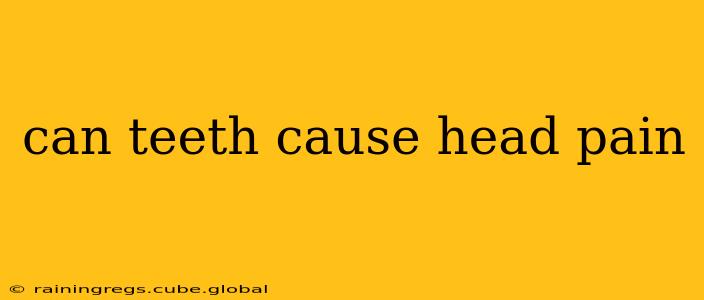Headaches are a common ailment, with many potential causes ranging from stress and dehydration to sinus infections and, yes, even dental problems. While it might seem surprising, dental issues can indeed trigger or contribute to head pain. Understanding this connection is crucial for effective diagnosis and treatment. This article explores the link between teeth and head pain, answering common questions and providing valuable insights.
How Can Teeth Cause Headaches?
The relationship between teeth and headaches isn't always direct. Often, the pain originates in the teeth or jaw but radiates to other areas, including the head. Several factors can contribute to this type of pain:
-
Temporomandibular Joint (TMJ) Disorders: The TMJ connects your jaw to your skull. Problems with this joint, like TMJ disorders, can cause pain in the jaw, temples, and even the head. This pain can manifest as headaches, often described as throbbing or aching. TMJ disorders can be caused by teeth grinding (bruxism), jaw injuries, or arthritis.
-
Dental Infections: Abscesses or infections in the teeth or gums can cause intense pain that can radiate to the head. The infection can spread, leading to more severe pain and even systemic illness if left untreated.
-
Sinusitis (Related to Dental Issues): While not directly caused by the teeth themselves, severe dental infections can sometimes exacerbate or contribute to sinusitis. Inflammation and infection in the sinuses can lead to sinus headaches, which often present as pressure or pain around the eyes and forehead.
-
Teeth Grinding (Bruxism): As mentioned above, grinding your teeth, often unconsciously during sleep, can strain the jaw muscles and TMJ, leading to headaches and jaw pain. The constant pressure can also cause damage to your teeth over time.
What Kind of Head Pain Do Teeth Cause?
The type of headache associated with dental problems can vary. It's not always a classic migraine or tension headache. Instead, it's often described as:
- Aching pain: A dull, persistent ache in the jaw, temples, or head.
- Throbbing pain: A pulsating pain, often intensified by chewing or jaw movement.
- Sharp, shooting pain: A sudden, intense pain that may come and go.
- Pressure pain: A feeling of pressure or tightness in the head or jaw.
- Pain that worsens with chewing or jaw movement: This is a key indicator of a dental-related headache.
Can a Toothache Cause a Headache in the Back of the Head?
Yes, depending on the location of the affected tooth and the severity of the dental problem, pain can radiate to the back of the head. This is more common with lower teeth and TMJ disorders. The pain might not be directly in the back of the head but felt as referred pain stemming from the jaw or neck.
What are the Symptoms of a Tooth-Related Headache?
Pinpointing a tooth-related headache from other types of headaches isn't always easy. However, several symptoms often indicate a dental origin:
- Jaw pain or stiffness: Pain or discomfort in the jaw, especially when chewing or opening your mouth wide.
- Facial pain: Pain in the face, particularly around the cheek, temple, or jaw.
- Sensitivity to touch or pressure: Tenderness when touching or pressing on the affected tooth or jaw.
- Pain that worsens when chewing or biting down: This is a strong indicator of a dental problem.
- Earache: Pain in the ear, often accompanied by jaw or facial pain.
How is a Tooth-Related Headache Treated?
Treatment depends on the underlying cause. It’s crucial to see a dentist or doctor for a proper diagnosis. Possible treatments include:
- Dental treatment: Addressing the dental problem, such as repairing a cavity, root canal treatment, or extraction of an infected tooth.
- TMJ treatment: Various treatments are available for TMJ disorders, including pain relievers, muscle relaxants, physical therapy, and sometimes surgery.
- Pain relievers: Over-the-counter pain relievers, such as ibuprofen or acetaminophen, can help manage pain temporarily.
- Mouth guards: For bruxism, a mouth guard can protect teeth and reduce jaw strain.
Disclaimer: This information is for educational purposes only and should not be considered medical advice. Always consult with a dentist or healthcare professional for diagnosis and treatment of any pain or discomfort. They can accurately assess your specific situation and recommend the most appropriate course of action.
